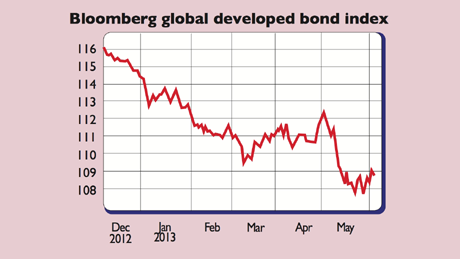Get the latest financial news, insights and expert analysis from our award-winning MoneyWeek team, to help you understand what really matters when it comes to your finances.
You are now subscribed
Your newsletter sign-up was successful
Want to add more newsletters?

Twice daily
MoneyWeek
Get the latest financial news, insights and expert analysis from our award-winning MoneyWeek team, to help you understand what really matters when it comes to your finances.

Four times a week
Look After My Bills
Sign up to our free money-saving newsletter, filled with the latest news and expert advice to help you find the best tips and deals for managing your bills. Start saving today!
The bond markets took a battering last month. A spike in global bond yields (bond prices fall when yields rise) "triggered heavy losses" for fixed-income-invested mutual funds, say Dan McCrum and Lucy Warwick-Ching in the FT. Every one of the most popular class of US mutual-bond-investing funds lost money in May as investors started to fret about the end of quantitative easing (QE). Figures from Lipper show UK bond-fund losses averaged 1.23%, with some funds losing 2.74%, according to Brian Dennehy of FundExpert, quoted in the FT.
The rise in yields has come as investors anticipate the end of the US Federal Reserve's $85bn-a-month QE programme. Fed chairman Ben Bernanke revealed last month that bond purchases aimed at keeping interest rates low may be reduced, depending on how good US economic data are. "This could have far-reaching consequences for the US debt markets," notes McCrum. Rising yields also sparked a US stockmarket sell-off late last week, says The Wall Street Journal, with stocks that benefit most from low interest rates, such as telecoms, utilities and real-estate investment trusts, taking the brunt.
Is it just a correction or is the 30-year bond bull market ending? Money continues to flow into bonds. According to Lipper, $136bn went into bond mutual funds in the first five months of 2013, compared with $145bn in 2012. Ten-year bond yields have only risen back to levels last seen in April 2012, says Jonathan Cheng in The Wall Street Journal.
MoneyWeek
Subscribe to MoneyWeek today and get your first six magazine issues absolutely FREE

Sign up to Money Morning
Don't miss the latest investment and personal finances news, market analysis, plus money-saving tips with our free twice-daily newsletter
Don't miss the latest investment and personal finances news, market analysis, plus money-saving tips with our free twice-daily newsletter

Some believe the bubble has already burst. "I am now throwing in the towel," Benoit Anne of Socit Gnrale told investors in a note. "We are no longer bullish on emerging markets." He may not be the only one. According to The Wall Street Journal, Barclays estimates that investors withdrew $2.89bn from emerging-market equity funds in the final week of May.
Others are less pessimistic. "This is only a catch for breath," Ruchir Sharma of Morgan Stanley Investment Management tells the FT. "Some countries will continue to do well and some will not." Other fund managers are looking to the economic stimulus from Japan to save the day. HSBC reckons $600bn of outflows from Japanese government bonds in the next two years should benefit markets in Malaysia, Turkey and Mexico.
If the US does taper QE off, "it will be a victory of hope over data", says James Saft on Reuters.com. The US economy looks increasingly shaky. Manufacturing orders were "sharply lower" in May, with one survey showing its worst results in four years, "consistent with an actual contraction". Chinese data have also been less than compelling. Even the Federal Advisory Council a group of bankers that advises the Fed says "it may be years before QE can be scaled back". Minutes from its 17 May meeting state that QE is "likely [to] continue for one to three years". With the US recovery far from steady, the Fed is unlikely to risk a recession.
For the policy to change, the Fed will want to see consistently better data. Instead, Bernanke's hints are pure posturing, aimed at getting investors used to the idea that QE will eventually end, says Saft. "Financial markets seem to view the tapering talk with a mix of reflexive cynicism and gripping horror," he notes. But it's possible to chalk this up to "expectations of the slaughter which would happen when its main customer [the Fed]... provides less support".
Get the latest financial news, insights and expert analysis from our award-winning MoneyWeek team, to help you understand what really matters when it comes to your finances.
MoneyWeek is written by a team of experienced and award-winning journalists, plus expert columnists. As well as daily digital news and features, MoneyWeek also publishes a weekly magazine, covering investing and personal finance. From share tips, pensions, gold to practical investment tips - we provide a round-up to help you make money and keep it.
-
 Pension Credit: should the mixed-age couples rule be scrapped?
Pension Credit: should the mixed-age couples rule be scrapped?The mixed-age couples rule was introduced in May 2019 to reserve pension credit for older households but a charity warns it is unfair
-
 Average income tax by area: The parts of the UK paying the most tax mapped
Average income tax by area: The parts of the UK paying the most tax mappedThe UK’s total income tax bill was £240.7 billion 2022/23, but the tax burden is not spread equally around the country. We look at the towns and boroughs that have the highest average income tax bill.

